- Home
- Lynne Truss
The Man That Got Away Page 2
The Man That Got Away Read online
Page 2
‘You are a bally genius, Mrs Groynes,’ he had conceded, ‘and I take my hat off to you. The hypnotism ruse was brilliant. No one will ever believe me now when I point the finger at you. They’ll say it’s all in my mind.’
‘That’s right, dear.’
‘But you forget that you’re still an enormous criminal, with a vast underworld network of ruffians, and as an officer of the law, I have to do something about you.’
‘But you don’t have to, dear!’ she had expostulated. ‘Because you’ve been stitched up like a kipper, dear! So now, in a way, you’re off the bleeding hook, do you see?’
And after a day or two to think about it, Twitten had reluctantly (and miserably) accepted her argument, because remaining a police officer was more important to him than anything else, and because plotting the eventual downfall of Mrs Groynes could be better done from inside than outside the force. And so here he was, accompanying the famous Inspector Steine in his public duties, and being careful not to say anything contentious. He was determined to fit in. Just two days ago, he had been issued with a brand-new white helmet, the traditional, exotic headgear of the Brighton policeman. Putting it on for the first time had been quite an emotional moment – until Mrs G privately pointed out that the introduction of white helmets had actually been her own idea. (‘It means we can spot a bleeding rozzer a mile off, dear!’)
‘I’ve never spent much time in a wax museum before, sir, have you?’ he said now.
‘No, none,’ said Steine.
‘Actually, my parents did take me to Madame Tussaud’s once, when I was nine, but we didn’t stay long because I started pointing out what was wrong with the exhibits.’
‘Why does that not surprise me, Twitten?’
‘Well, I believe you’ll sympathise, sir. I don’t know if you’ve heard of the famous model of a policeman on the stairs that’s supposed to be so lifelike people ask him what time it is?’
‘Yes, thank you. I have heard of that wax policeman. Everyone has.’
‘Well, sir, naturally I rushed to see him, and people were crowding round, saying, “Ooh, isn’t he lifelike?” and “I keep expecting him to speak!” and also, of course, “Up yours, you filth! Your lot stitched up our Jimmy!” And what do you think, sir? The buttons on his tunic didn’t match with the style of his helmet!’
‘What?’
‘That’s how bally un-lifelike he was, sir.’
Steine was shocked. ‘Are you sure?’ he said. ‘In Madame Tussaud’s?’
‘Yes, sir. The buttons were Metropolitan; the helmet was City of London! What a blunder! Any schoolboy knows the difference! You would think they’d be interested, but when I pointed it out, they asked Father to take me away at once!’
At Luigi’s, the inspector’s favourite ice-cream parlour, where the jukebox was playing Perry Como’s ‘Papa Loves Mambo’, and all the top windows were open, a distinguished-looking middle-aged man in a homburg hat and light raincoat plonked a holdall on to one of the shiny brown tables, with his frothy coffee beside it.
It was a glorious day to be at the seaside, and Luigi’s was buzzing with youthful customers (quiffs, bobby socks, ponytails) ordering banana splits and Knickerbocker glories, and also respectable couples in their twenties drinking coffee from stylish Pyrex cups and saucers.
One such young couple smiled across to the man, who introduced himself with the single word ‘Melamine’, and warmly shook their hands. Fifteen minutes later, the couple left, hysterical with laughter. As they told their friends back in Palmers Green afterwards, ‘Lord Melamine’ had really taken them in to begin with. He sounded so very posh!
At the police station, they were having a quiet day. Mrs Groynes poured Sergeant Brunswick a cup of tea and offered him a slice of gala pie, complete with a segment of hard-boiled egg. He sat down to receive both at his desk.
‘Lovely, Mrs G,’ he said, appreciatively. ‘That’s lovely, that is.’
Mrs Groynes smiled. She knew how to keep her boys happy. As it happened, their needs were absurdly simple, but she had genuine affection for them anyway, especially Sergeant Brunswick. She liked to think of herself as a sort of substitute mother to the well-meaning sergeant – a substitute mother with just a bit of a dark side. On the one hand, she brought in tasty things for him to eat because she knew he liked them; on the other, she might arrange for him to be shot in the leg if it served a wider purpose.
It was a beautiful relationship, and the sergeant certainly cherished it, and never got impatient with Mrs Groynes when (say) important bits of criminal evidence, left in his desk drawer for safe-keeping, were accidentally thrown away with the tea leaves.
‘I’ve got some of those so-called London cheesecakes for later, dear,’ she said now, her eyes twinkling. ‘With that nasty shredded coconut on the top.’
‘I’d be as fat as butter if you had your way, Mrs G.’
‘You deserve it, dear,’ she said. ‘Now … how’s the leg?’
Sergeant Brunswick winced at the reminder. He had indeed recently been shot in the leg at close range, as part of a classic criminal master-plan that climaxed at the Hippodrome in Middle Street. This master-plan had, of course, been entirely conceived by the dowdy woman in a paisley overall now swabbing the lino with a mop.
‘The funny thing is, it’s quite itchy,’ he said.
‘You’re right, dear,’ said Mrs Groynes, thoughtfully. ‘That is funny.’
Brunswick sighed, and sat munching his pie and sipping his tea in contented silence for a little while, while Mrs Groynes mopped. He was such a nice-looking man, she thought, it was a shame he never had a girlfriend. The trouble was, women seemed to sense his desperation.
‘Did young Clever Clogs Twitten show you that book he’s reading, Mrs G?’ the sergeant asked at last, the gala pie now reduced to a few pastry crumbs.
Mrs Groynes stopped mopping. ‘What book’s that, then?’
‘Blimey, you’re lucky!’ said Brunswick. ‘He’s flaming obsessed with it. It’s called Noblesse Oblige, if you please.’
‘Never heard of it, dear.’
‘Well, it’s written by this la-di-da woman, and it’s about how the so-called “upper class” have got different names for things from the rest of us.’
‘Have they?’
‘Well, so this book says. So if you say a word like radio or serviette, people can tell, just like that – ’ Brunswick clicked his fingers ‘ – you’re not upper class.’
‘But everyone says radio and serviette, dear.’
‘I know!’
‘And who wants to sound upper class, anyway? That’s daft.’
‘I know. Young Twitten asked me what I’d call that, for instance.’ He indicated a mirror on the wall.
Mrs Groynes was confused. ‘What you’d call what, dear? The mirror?’
‘Exactly. I said, “What would I call that mirror? What would I call it? I’d call it a mirror, son, because it is a flaming mirror!”’
‘No flies on you, dear.’
‘But he said an upper-class person would say “looking-glass”.’
Mrs Groynes shrugged and gave an exaggerated sing-song, ‘Ooh.’
‘I know,’ agreed Brunswick. ‘Talk about pointless. But apparently everyone’s buying this book and talking about it.’
Mrs Groynes sighed heavily as if to ask what the world was coming to, lit a full-strength Capstan from a lady-like pack of ten, took a thoughtful drag and then handed the sergeant the latest Police Gazette.
‘Hot off the press, dear,’ she said, expertly exhaling at the same time.
‘Oh, good.’ He loved perusing the Police Gazette, which was just as well because it was part of his job to read it every day. It was Mrs Groynes’s usual practice to read and digest it first, of course. The information in it was invaluable if you were a vigilant master-criminal with a network of around two hundred villains. But today it had arrived later than usual and she hadn’t had the chance.
‘Here,’ Brunswick
said, ‘imagine when a toff goes to buy the Daily Mirror and he can’t say it! He keeps asking for the Daily Looking-Glass!’
Mrs Groynes laughed. ‘They wouldn’t know what he meant! Poor bleeder would be there all day!’
Back at the Maison du Wax, things were less harmonious. In fact, they were quite sticky. Constable Twitten was pointing at a full-length mirror propped against the wall in the measuring-room, to the confusion of his senior officer. And he was beginning to wish he had never started it.
‘That mirror, you mean, Twitten?’
‘Yes, sir. But please let’s drop the subject, sir. I’m sorry. It’s just a book. By Nancy Mitford. Noblesse Oblige, sir. It’s been quite controversial. It’s basically about the differences between what she calls “U” and “Non-U”, and truly, sir, it’s bally fascinating, and I’m sure the whole field of socio-linguistics has practical applications for police work, you see, but people keep getting annoyed when I talk about it, so I should probably bally well belt up about it, sir.’
‘No, look, hang on. You started this, Twitten. You’re asking me what I would call that mirror?’
‘Well, yes.’
‘I’d call it a mirror, Twitten. Good grief.’
‘So, not a looking-glass, sir?’
Steine swallowed hard. ‘I don’t understand what you’re getting at, Twitten.’
‘There’s no need to be irritated, sir.’
‘But it is a mirror, Twitten. Of course I’m irritated.’
‘Even if I tell you that “mirror” is a “Non-U” indicator, sir?’
‘Especially if you tell me that.’
At that moment, luckily for Twitten, the great blind model-maker Pierre Tussard made his entrance, wearing a crimson velvet cap-and-robe ensemble and shuffling behind his daughter, his hand dramatically on her shoulder, his head strangely angled, his eyes closed. Despite the ridiculous picture they made, Twitten couldn’t have been more pleased to see them. Would he be allowed to leave, now? To go outside in the sun and read the rest of his book?
The answer was yes and no. ‘You make yourself scarce, Constable,’ said Steine, still sounding agitated. ‘But don’t leave the building. We haven’t finished discussing this mirror business.’
‘Yes, sir. I mean, no, sir. I’ll wait on the landing, sir.’
Meekly, Twitten donned his shiny white helmet and left the room.
Outside, at the top of the stairs, he stood for a while, just thinking. How defensive everyone got on this issue of U and Non-U words! It made no sense to him. Why weren’t they fascinated by the revelation that upper-class people said ‘preserve’ instead of ‘jam’, or ‘wireless’ instead of ‘radio’, or ‘mad’ instead of ‘mental’? Wasn’t it worth knowing that an upper-class person would despise you for referring to your fish-knives or your cruet set, or (worst of all) your toilet? Snobbery was a living thing in modern British society! Surely it was important to know how it operated?
He was so deep in thought that at first he didn’t notice the small crowd of visitors gathering on the staircase below him, looking up with interest. And then he realised what was happening, and froze. A policeman at the top of a flight of stairs in a wax museum! Did they think he was a model? Crikey. Thank goodness his tunic buttons and helmet were stylistically complementary.
The small crowd approached, to look more closely.
‘That is bleeding lifelike,’ said a young man with a Brylcreemed quiff and prematurely blackened teeth. ‘Ere, what’s the time, mate?’
Twitten stopped breathing. Understandably, he was tempted to reply ‘Half-past nine, sir’, but worried about the accident it might cause. What if alarmed holiday-makers stepped backwards into space and then tumbled in a heap down the stairs?
The teenaged girl on the Brylcreem-boy’s arm laughed and gazed up. ‘Shall I pinch him, Roy?’ she said. ‘Shall I knock his helmet off?’
‘Go on, Em. I dare you,’ said an older woman.
Twitten mentally braced himself, but luckily the girl decided she didn’t have the nerve and the group passed on to the upper floor, giving him an opportunity to exhale. But at what point could he move? It was while he was pondering his predicament – and continuing to stand completely still with a fixed expression – that he happened to overhear a conversation between a pair of star-crossed young lovers that would – given what happened later – haunt him for the rest of his life.
Back on the seafront, Brighton Belles Phyllis and Adelaide decided to stop at Luigi’s for a refreshing glass of hot milk before continuing with their duties, and found themselves sitting beside a man in a felt hat with a heavy bag in front of him on the table.
‘May I introduce myself to you lovely ladies?’ he said. One of his eyes pointed in slightly the wrong direction, which was unsettling, but he had a beautiful voice.
‘I’m the Fifth Marquess of Colchester,’ he said, in a confiding tone. ‘But you can call me Melamine.’
They smiled at him and shook his proffered hand. He registered the names on their little lapel badges. The brunette was Phyllis; the girl with the rich brown hair was Adelaide. As it happened, Adelaide’s hair was technically chestnut, while her eyes were almond-shaped, and hazel-coloured. As her mother used to say (presumably as a compliment), Adelaide had been born with all the nuts.
‘Now,’ Melamine said, shifting the bag a little closer to them, ‘I’m wondering if you’ve ever heard the story of the gold from the battleship Potemkin?’
The two women exchanged glances. They’d been warned about con men, but they’d somehow imagined that a con man would be a little bit harder to spot.
‘I don’t think so,’ said Adelaide, amused. ‘Have you heard of the gold from the battleship Potemkin, Phyllis?’
‘Not me,’ said Phyllis.
‘Russian gold! Imperial gold!’ enthused Melamine. ‘It was thought to be lost during the uprising of 1905, sunk in the depths of the Black Sea. But in the 1920s it turned up in the possession of none other than Rudolph Valentino!’
The Belles raised their eyebrows at each other. This man was possibly the least convincing liar the world had ever seen. They now understood the comments they had overheard from a young couple they had bumped into outside Luigi’s. ‘He was hopeless, Alfie!’ the woman had said, and the man had replied, ‘Yes, but you can’t fault him for trying! Rudolph Valentino!’
‘Gosh,’ said Phyllis, now, trying to keep a straight face. ‘Rudolph Valentino. That’s very romantic.’
‘Yes, it is romantic,’ said Melamine, clearly making a note of a useful word that had previously not occurred to him. His faraway look was weirdly enhanced by the fact that his eyes pointed in different directions.
‘But the Nazis sadly got hold of it, and then – ’ He leaned closer, surreptitiously pushing the bag towards them, and quickly opening it to reveal the presence inside of several large gold-coloured bricks ‘ – General Eisenhower liberated it from Berlin. And he placed it in the safe-keeping of my father, the Fourth Marquess, not realising that the poor, sad man was seriously mental and would forget where he had left it.’
‘What a truly incredible story,’ said Adelaide, between lady-like sips of warm milk. She turned to her friend, eyes twinkling. ‘That is literally incredible, isn’t it, Phyllis?’
‘It is, yes. Literally.’
Melamine seemed pleased. ‘Thank you very much,’ he said.
‘May I ask why you’re carrying it around, sir?’ said Adelaide. ‘The gold? It’s rather careless of you. Someone might steal it.’
‘But I have to get rid of it, that’s the point! I don’t usually go around talking about my family’s Russian gold to total strangers in coffee bars. No, I’m in a fix, my dears, and I need help.’
‘Here it comes,’ murmured Adelaide.
‘Ladies,’ Melamine announced, solemnly. ‘For complicated reasons too shaming to relate, I’m willing to sell this gold of mine to you for as little as twenty-five pounds a brick! What you see before you is a despera
te, desperate aristocrat.’
A less convincing story would be hard to imagine, and the kind thing would have been to stand up, plead an appointment elsewhere and go. But Adelaide had indeed been born with all the nuts, and was enjoying herself.
‘Oh, I’m so sorry to hear that,’ she said, reaching over to pat his hand. ‘But I don’t understand completely. What sort of complicated reasons? And why are they shaming?’
‘Can’t you guess?’ he said.
‘Well, no.’
‘Tax!’ he said, with what sounded like genuine frustration. ‘It’s all about tax and those dreaded new-fangled death duties. “You’ve never had it so good,” the man says on the radio, but not if you inherit a country house and estate in 1957!’
‘I see.’
‘You can’t imagine how hard things are for the landed gentry. My father dealt with nothing, being too mental. He didn’t declare this hidden Russian gold, which is worth – each brick! – just under five hundred pounds! The ancestral home is on the verge of collapse. All over the country, families like mine are selling their silver cruets and serviette rings! Yes, it’s a topsy-turvy world we live in, ladies, but the long and short of it is this: if I’m still in possession of Father’s confounded gold at the end of the month, I’ll be ruined!’
So what was the momentous conversation Twitten overheard at the wax museum? It was only because he had spent five minutes standing immobile on the landing that he noticed something that would never otherwise have caught his eye: at the top of the stairs, in the wall that (he calculated) ought to comprise the back of the building, was the well-disguised outline of a jib door.
‘A secret door?’ he said aloud. He wondered what to do. Should he stop pretending to be a waxwork and investigate? There was someone approaching the stairs below – he could hear footsteps echoing through the entrance hall – so he would have to make up his mind quickly. But too late! A scratching sound came from behind the secret door, then it opened and a young woman stepped out nervously.

 Get Her Off the Pitch! How Sport Took Over My Life
Get Her Off the Pitch! How Sport Took Over My Life Going Loco
Going Loco Talk to the Hand
Talk to the Hand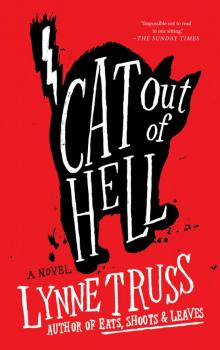 Cat Out of Hell
Cat Out of Hell Eats, Shoots and Leaves
Eats, Shoots and Leaves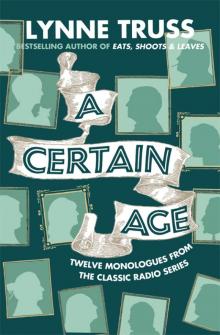 A Certain Age: Twelve Monologues From the Classic Radio Series
A Certain Age: Twelve Monologues From the Classic Radio Series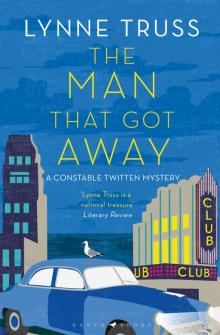 The Man That Got Away
The Man That Got Away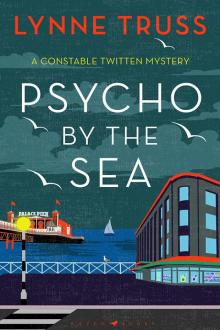 Psycho by the Sea
Psycho by the Sea With One Lousy Free Packet of Seed
With One Lousy Free Packet of Seed Tennyson's Gift: Stories From the Lynne Truss Omnibus, Book 2
Tennyson's Gift: Stories From the Lynne Truss Omnibus, Book 2 Get Her Off the Pitch!
Get Her Off the Pitch! Tennyson's Gift
Tennyson's Gift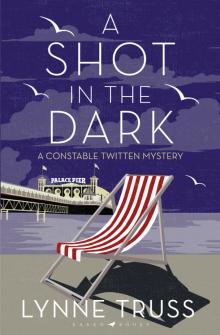 A Shot in the Dark
A Shot in the Dark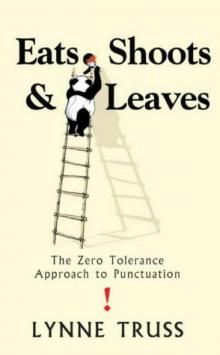 Eats, Shoots and Leaves: The Zero Tolerance Approach to Punctuation
Eats, Shoots and Leaves: The Zero Tolerance Approach to Punctuation